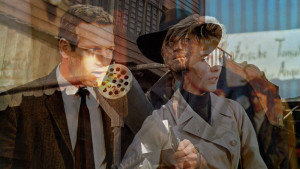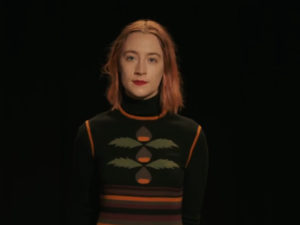
“On ne change pas. On met juste les costumes d’autres sur soi,” all three of Mommy‘s lead actors dance and sing, along to the sweet voice of Canadian treasure Céline Dion coming from the radio. The scene, which comes not too far into the film, is an example of the pure bliss and comfort that comes with finding the people you can truly call family, whether or not they’re actually related to you. And with Mommy, Xavier Dolan’s fifth film, the filmmaker further explores the ups and downs of familial relationships and ends up with his greatest achievement to date.
For all the praise that folks — myself included — have heaped on Patricia Arquette’s motherhood arc in Richard Linklater’s Boyhood, Mommy could easily be considered Dolan’s own depiction of motherhood. Both have similarities: single parenthood, growing boy, tough living situation (although Boyhood does away with that in time while Mommy fixates on it), but the mother-son relationship in Mommy is of a completely different nature. The film kicks off with Diane (Anne Dorval) picking up her son, Steve (Antoine-Olivier Piton), from the institution where he was being treated for mental health issues. Among them, while not explicitly stated, is his bipolar disorder; subject to fits of rage in which profanity and punches fly everywhere, even at his loved ones.
Neither Diane nor Steve are particularly “likable” people, but none of Dolan’s characters ever really are, regardless of how compelling their narratives are. Diane is simply a woman trying very hard to deal with the shitty cards life has dealt her, which range from an unstable son to scrubbing toilets to survive after losing her job. Dorval, who has worked with the filmmaker before (most notably in his first feature J’ai tué ma mère), lends her character such an air of realism through her dialogue delivery and, most importantly, her expressive face. As talented as Dolan is at conveying feeling through his back-of-the-head shots, his mastery of the close-up is at its peak, and Dorval’s face — which is nearly indistinguishable from his own in the way she smirks and sighs on camera — is the perfect subject for his lens.
But she’s not the only mother involved in Mommy; the other being Kyla (Suzanne Clément), the neighbor from across the street who suffers from crippling social anxiety (along with some likely depression) and finds herself more attune to the Després family than her own. It’s fascinating to see two characters dealing with two different forms of mental illness on screen without ever resorting to anything exploitative, with both Clément and Piton falling into their similarly-hefty roles as effortlessly as Dorval. Some will certainly criticize the film for the way it amps up the melodrama and pain when necessary, but the narrative comes second to the emotions being presented in Mommy. It’s an operatic tale more than anything, and an incredibly raw one at that, which constantly uses music to emphasize its impact. Songs like Oasis’ “Wonderwall,” Lana del Rey’s “Born to Die,” Dido’s “White Flag,” and even Eiffel 65’s “Blue (Da Ba Dee)” populate the film, and as on-the-nose as some of the choices are, each piece is essential to the atmosphere that Dolan is creating for these characters and ever-reflective of their moods.
The most fascinating atmosphere that Xavier Dolan establishes with this film though is a non-explicit queer one, which is to say that while there are no outright queer characters (although Steve’s likely bisexuality is hinted at but of no import), the friendship between Kyla and Diane mirrors a queer parenthood almost perfectly. Nothing romantic happens between them, but they have their unlikely meet-cute, their strange way of raising a child together, and even the kind of moments that would lead a couple to break-up together. Both Diane and Kyla are presented in such differing lights — each one taking on a vastly different approach to raising Steve — but at the end of the day, they’re both in it for him and for each other. As much as the film is dedicated to showing the emotional toll motherhood takes on both of these women, especially Diane, Mommy is just as committed to showcasing the tenderness that comes with creating a small family that fosters a positive attitude in a seemingly dismal environment (one which none of these characters could have achieved on their own).
And in quarters both wide and tight — the film’s 1:1 aspect ratio rarely feeling claustrophobic even when it expands its horizons from a limited perspective to one that covers the joy of this family — the love they share for each other and for Steve is clear. Something as simple as him taking a photograph of the three of them together on his cell-phone, printing it out and framing it, as though he’s finally found the missing piece of his family, is as full of sweetness as a sweeping montage of Diane imagining what Steve’s future could be like someday if she didn’t feel she was failing in her ability to handle motherhood. The latter scene takes the cake, of course, as it’s one of the most simultaneously optimistic and heart-shattering moments of Mommy, even though pessimism flows through its every vein.
As someone who’s watched Xavier Dolan’s career shift and develop over the years — his work prior to this, Tom at the Farm, surprising me with its Hitchcockian thrills — it’s somewhat of a personal pleasure to have the ability to call his latest film a masterful and truly beautiful one. Mommy is full of a rare intimacy in every aspect; its flawed characters and their longing glances, its focused lens and narrative, and music that recalls a certain comforting nostalgia for a world we may or may not have experienced ourselves.
—
Directed by Xavier Dolan; written by Xavier Dolan; starring Anne Dorval, Suzanne Clément, and Antoine-Olivier Pilon; 139 minutes.
Mommy is currently experiencing a limited release. In Miami, the film opens at the Miami Beach Cinematheque and Coral Gables Art Cinema on February 13th.



 Derek
Derek
 Isabelle
Isabelle